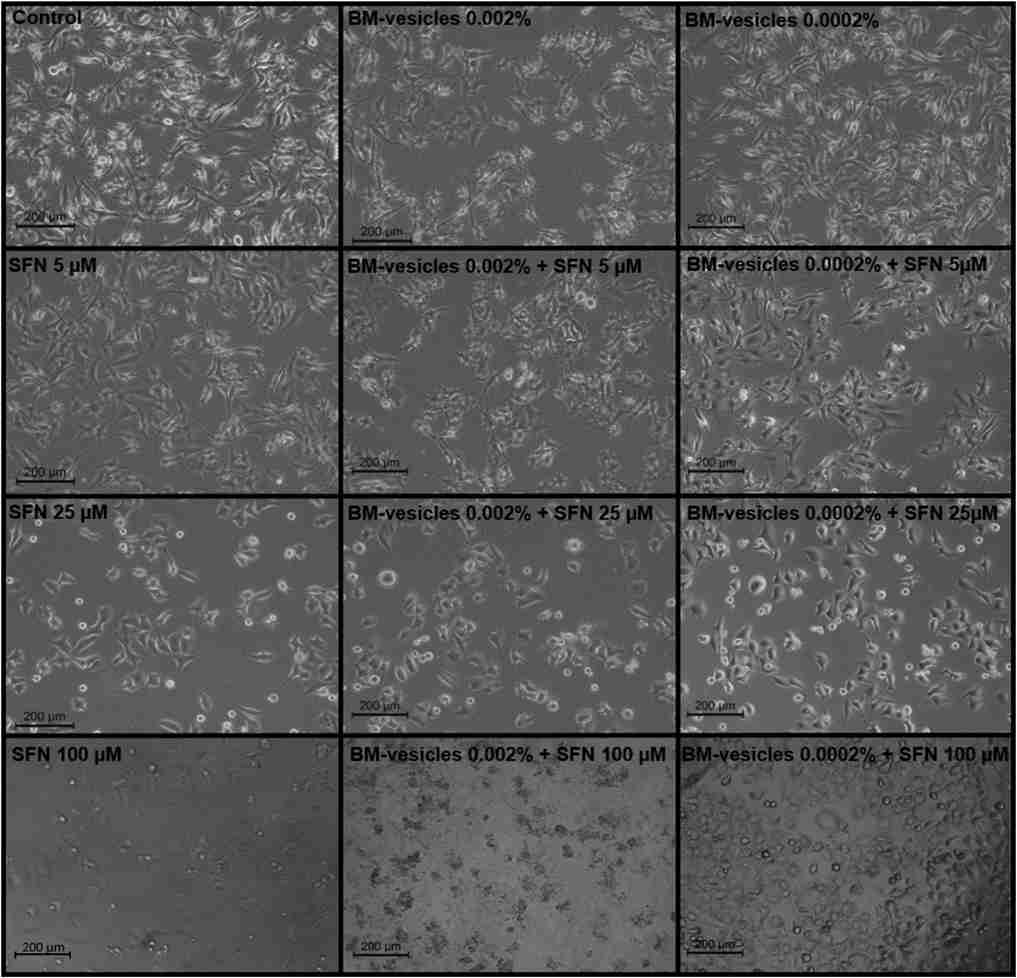Broccoli -derived Exosome Research and Application
Broccoli is a highly nutritious vegetable rich in bioactive compounds that contribute to cell protection, reduce the risk of chronic diseases, inhibit cancer development, and enhance immunity. Regular consumption of broccoli can be a part of promoting overall health. Creative Biolabs is a biotechnology company that offers a range of exosome-related biotechnology services and is confident in providing technical support for potential broccoli-derived exosome development.
 Fig.1 Phase-contrast microscopy images of SK-MEL-28 cells treated with different treatments.1,2
Fig.1 Phase-contrast microscopy images of SK-MEL-28 cells treated with different treatments.1,2
Multiple Benefits of Broccoli
-
Antioxidant Action: Broccoli is rich in antioxidant components such as ascorbic acid, carotenoids, vitamin E, and phenolic compounds, which help eliminate free radicals and reduce cell oxidative damage.
-
Anti-Cancer Effect: Active components in broccoli, such as sulforaphane and glucoraphanin, have been associated with reduced cancer risk. They can regulate intracellular antioxidant enzymes, activate anti-cancer genes, and inhibit the growth and spread of cancer cells.
-
Cardiovascular Protection: Various components in broccoli, including carotenoids and sulfides, can help improve cardiovascular health by reducing cholesterol levels, protecting blood vessel walls, and reducing the risk of blood clot formation.
-
Immune Regulation: Active components in broccoli can enhance the body's resistance to infections and diseases by modulating the immune system.
-
Anti-Inflammatory Effect: Certain components in broccoli have the potential to control inflammatory responses, helping alleviate symptoms of chronic inflammation-related diseases.
Summary of Broccoli-Derived Exosome Research
Broccoli has been extensively studied for its nutritious components and bioactive compounds, particularly its anti-cancer properties. Therefore, researching broccoli-derived exosomes may help uncover these potential health benefits.
|
Potential Function
|
Target
|
Possible Mechanism
|
|
Anti-Colitis
|
Dendritic cells (DCs)
|
Broccoli-derived exosomes induced tolerogenic AMPK+ DCs, effectively inhibiting mouse colitis.
|
|
Anti-Melanoma
|
Melanoma cells
|
Sulforaphane encapsulated in broccoli-derived exosomes reduced melanoma cell proliferation by promoting metabolite generation and reducing cancer molecular markers.
|
|
Anti-Cancer
|
Human colorectal adenocarcinoma cells
|
Broccoli-derived exosomes encapsulating astaxanthin significantly inhibited the proliferation of human colorectal adenocarcinoma cells.
|
|
Anti-Cancer and Antioxidant Effects
|
Cancer cells
|
Broccoli-derived exosomes containing antioxidant compounds reduced oxidative stress in various cancer cell lines, impacting cancer cell metabolism.
|
|
Delivery of Therapeutic miRNA
|
Human colorectal adenocarcinoma cells
|
Broccoli-derived exosomes encapsulating therapeutic miRNA promoted the death of human colorectal adenocarcinoma cells compared to free miRNA treatment.
|
|
Anti-Cancer
|
Human pancreatic cancer cells
|
Exosomes derived from selenium-rich broccoli are loaded with miR167a, which significantly promoted apoptosis in human pancreatic cancer cells by regulating the IRS1/PI3K/AKT pathway.
|
Creative Biolabs leads in the field of plant exosome extraction and development services, providing innovative solutions to support broccoli-derived exosome research. For further information or collaboration, please feel free to contact us for detailed technical support and customized services. These services include:
Plant-Derived Exosome Isolation
Plant-Derived Exosome Identification
High-Throughput Screening Analysis (Proteins, RNA, Lipids and Metabolites)
Large-Scale Production of Plant-Derived Exosomes
References
-
Yepes-Molina, L.; Carvajal, M. Nanoencapsulation of sulforaphane in broccoli membrane vesicles and their in vitro antiproliferative activity. Pharmaceutical Biology. 2021, 59(1):1490-1504.
-
under Open Access license CC BY 4.0, without modification.
For Research Use Only. Cannot be used by patients.
Related Services:

 Fig.1 Phase-contrast microscopy images of SK-MEL-28 cells treated with different treatments.1,2
Fig.1 Phase-contrast microscopy images of SK-MEL-28 cells treated with different treatments.1,2









